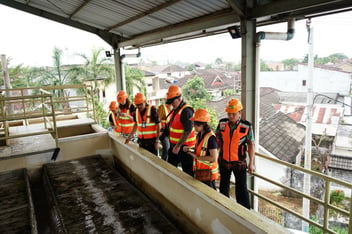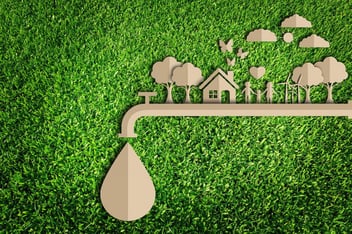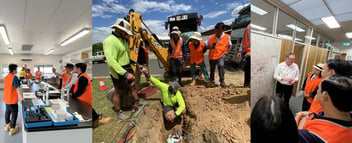Climate resilience built on kinship
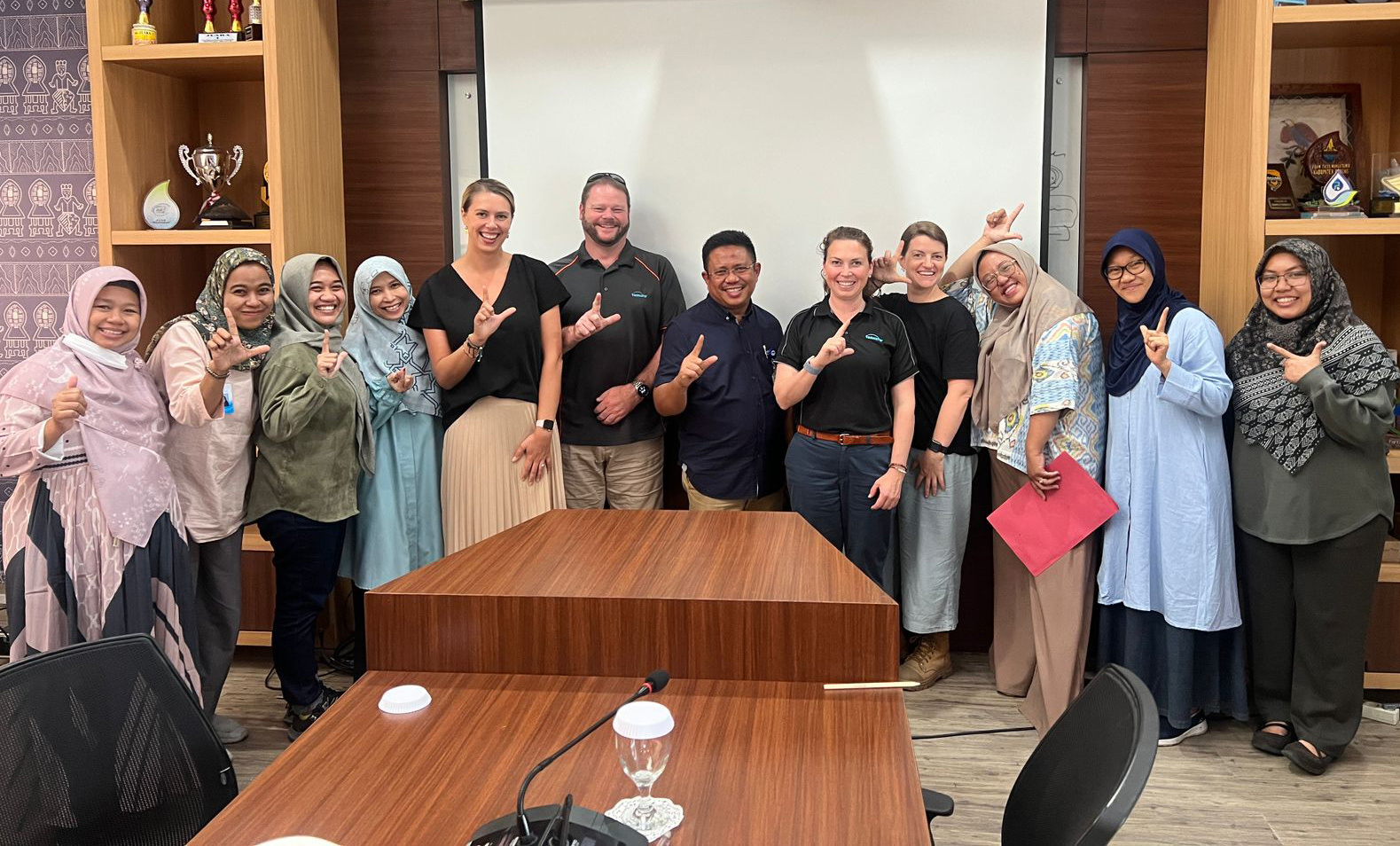
Monique Byrne from TasWater travelled to Indonesia as part of the AWA facilitated Partnerships for a Resilient and Climate Smart Water Sector program, supported by the Australian Government via Australian Water Partnership (AWP). Read her powerful reflection on the experience below.
What benefit could I possibly offer an Indonesian water utility? I was still wrangling this thought as our flight from Jakarta to Lombok landed. The humidity was a welcome relief after a cold start to the Tasmanian autumn.
After giving my husband a quick lesson in how to braid hair, which ended in – just do your best – and many reassuring conversations with my two young daughters along the lines of – yes, I promise Dad will be able to make your porridge exactly the same way – my family were up early to wave me off. I was departing Launceston, Tasmania, and traveling to Lombok, Indonesia, as one of four Australian delegates to participate in a knowledge-sharing program between two water utilities.
On arrival, our partners from Giri Menang PDAM collected us from the airport where we chatted more casually than our recent, formal video conferences. The next three days would be intensive. We toured springs, river intakes, a water treatment plant, storages and monitoring systems. We studied non-revenue water data trends and exchanged performance statistics. I poured over water quality guidelines issued by their Ministry of Health through google translate on my phone held up in front of their laptop screen. We tried our best to describe our emergency management processes embedded within an inter-agency approach. And compared problems when unexpected, intense rainfall caused blocked intakes, and challenged our treatment plants.

It appeared neither party was completely confident of understanding the other, but each day built upon the picture from the last.
Beyond technical conversations, I was always asked – Are you well? Do you need anything? How is your family? I was observing consistent themes in the workplace; family, faith and connection. Islam was ever-present, a firm priority and interwoven through their personal and professional life. Lombok is known as the ‘island if 1000 mosques’ and the Adhaan was a steady call every few hours. It was peaceful to witness every day.
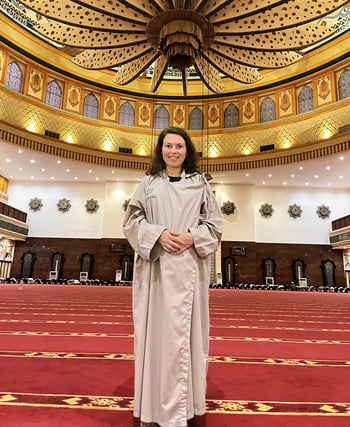
We were on a break from a non-revenue water presentation, and I went to find a bathroom. It was down the other end of the building, so I enjoyed the walk on the second floor, taking full advantage of the opportunity to discreetly peer into every doorway - as you do when curious and abroad.
The bathroom was right next to the entry of a very large indoor gym, the size of a basketball court. I was surprised to see this kind of space as part of a water utility’s office building, and more surprised to find loud music and some twenty people exercising! When I returned, I asked our hosts about the activity and was told it was an exercise session put on for the families of staff. Giri Menang facilitate a program to bring their families together, to encourage kinship, but to also provide financial assistance to spouse’s small businesses or support their children with educational scholarships. I expressed my surprise and was told, ‘we are a big family, we look after each other’.
This is a distant sentiment for many Australian workplaces. And if it is present, it is consciously built with intentional participation – not stemming from a cultural responsibility to take care of everyone. I wondered how Australians would benefit from this kind of community support that underpinned this exercise program.
On another occasion we were taken to a location where you could climb a hill for a spectacular view. I had hurt my knee months before, so I was content to stay down, taking photos of buffalo and sipping on coconuts. Our two drivers and translator sat under a grass-thatched shelter for a break and casually began talking to other people sitting in the shade. I noticed how friendly and personable their interaction was. We stopped another time for a cultural village experience and I noticed it again. I thought – no way can they know all these people in completely different locations, random times, not to mention there are three million people on this island!
I asked our translator, ‘do you know these people?’ He said, ‘yes, I know them all’. After I was visibly surprised, he corrected himself and said, ‘no, I don’t know them, but we are friends.’ I asked him to explain further. This made me smile as I could see he wasn’t sure if I understood English. He explained that he knows everyone, not individually, but if they are from a region or local area close to you, it is as though you do know them and that means you are friends. I landed on – it’s a vibe – and I loved it.

We ate almost every meal together. My Giri Menang family are no longer an impersonal collective of climate-impacted communities that I briefed myself on before my trip – I now know their names. After a long day of work, I ceased talking ‘shop’, put on hold conversations of operating procedures and risk assessments, and shared a meal. I listened as one new friend spoke proudly of his funny little girl. I laughed as another was gently teased about finding love. I related deeply to the young professional who was expecting, and what the baby’s care arrangements would be when she would return to work.
At some stage over the three days, I realised my initial fears of being inadequately equipped to provide benefit was misguided. I was missing the point. I was not there to be a consultant and solve problems for them, but to facilitate the exchange of knowledge that increased their capability to develop their own climate-resilient processes.
Both utilities had a responsibility to provide an essential service, regardless of the environmental challenge. I was there to listen, to understand their challenges, and to absorb information. My role was to tap into the wealth of knowledge built up by our experienced TasWater staff and facilitate that exchange through conversations, presentations, workshops and more sharing meals. Our response was not to say – here is what you need to do – but – here is how we do it, I can now see this might be useful to you.
Clean water and sanitation are essential to all communities, regardless of place, and climate-resilient water services can meet that need. No individual’s health is less valuable than another’s and we all face challenging hazards from climate impacts. Over one short week, I learnt that building our capacity to provide climate-resilient water services is a common challenge, progress happens together, and if we treat each other more like family, we might get there a lot faster.
Want to hear more about International Partnerships? Monique Byrne, along with TasWater's Antoine Chassagne, will be speaking at the upcoming TAS Where the Waters Meet Conference on 21 August. You can view more details and the conference program here.

